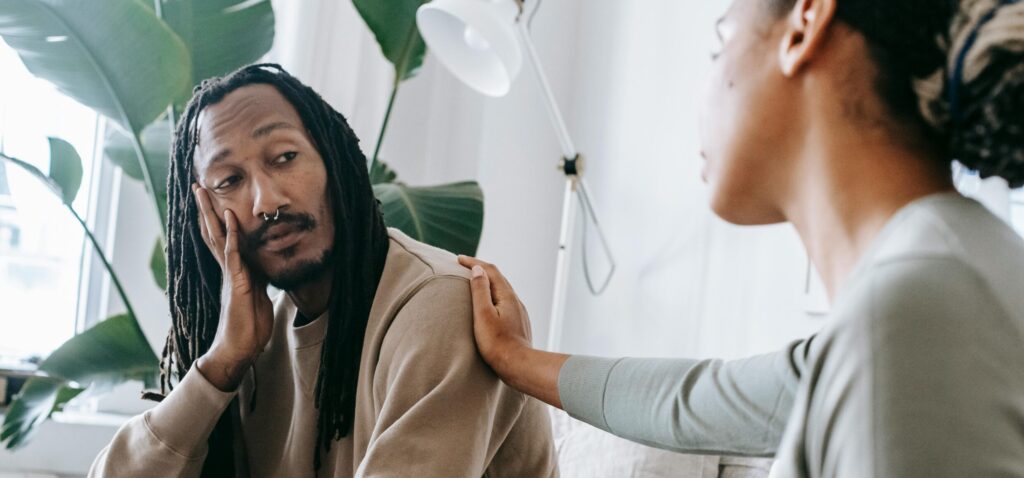Drug addiction, clinically described as substance use disorder, can result from the sustained abuse of illicit drugs or prescription medications. Substance use disorder is a chronic but treatable condition that responds favorably to evidence-based interventions. Read on to discover where to get help for drug addiction.
How to Get Help for Drug Addiction in 10 Steps
While all substance use disorders are unique, there are some general steps to take if you’ve been wondering how can you get help for drug addiction:
- Acknowledge the need for help
- Reach out to someone you trust
- Learn as much as possible about addiction
- Explore treatment options
- Engage with professional treatment
- Follow your treatment plan
- Develop a sober support system
- Take care of your physical and mental health
- Set healthy boundaries
- Remain committed to recovery
1) Acknowledge the need for help
Working out how do you get help for a drug addiction starts by recognizing that you need support and guidance addressing substance use issues. Reaching out for help should be considered a strength rather than a weakness. Once you have developed this awareness – and it might mean overcoming denial – it’s time to begin the process of finding appropriate help.
2) Reach out to someone you trust
Choose to share your struggles with a friend, family member, or mentor. Doing so can lighten your emotional load and provide you with support and understanding at a challenging time. Pick someone who will listen without judgment and offer the compassion and empathy you need.

3) Learn as much as possible about addiction
Drug addiction is a chronic and relapsing brain disorder that triggers structural and functional brain changes over time. Addiction is also a relapsing condition, with research showing that up to 60% of those who participate in formal treatment relapse once or more in their ongoing recoveries. The more that you learn about the nature of drug addiction and its effects, the more informed steps you can take toward recovery.
4) Explore treatment options
There are many paths to recovery, including residential treatment programs (inpatient rehab), outpatient programs, support groups, and sober living communities. Research and consider what options might best suit your needs and lifestyle, and which form of treatment is most appropriate for the severity of your addiction. Those with severe addictions, co-occurring mental health disorders, and unstable home backgrounds usually benefit from inpatient treatment. Outpatient programs are flexible and affordable alternatives for those with milder substance use disorders.
5) Engage with professional treatment
Reach out to a healthcare provider, addiction specialist, or mental health professional who can assess your situation and recommend appropriate treatment options. Seek recommendations from friends and family members if you have no idea where to get started.
6) Follow your treatment plan
The first step of the treatment process involves an assessment. Based on the results, the treatment team will create an individualized treatment plan for your long-term recovery. This should include your treatment goals, steps to achieve them, techniques for managing cravings and triggers, and relapse prevention strategies. A reputable rehab will offer help from supervised detox through ongoing therapy and comprehensive aftercare.
7) Develop a sober support system
In addition to professional help, seek out support groups like NA (Narcotics Anonymous) or SMART Recovery. Connecting with others who are facing similar challenges can provide invaluable empathy, understanding, and encouragement throughout the process.
8) Take care of your physical and mental health
Recovery involves more than just stopping drug use. It should also involve taking care of your body and mind. Focus on nutritious eating, regular exercise, adequate sleep, and mindfulness or meditation practices.
9) Set healthy boundaries
Identify situations, places, and people that trigger your drug use and set boundaries to protect your recovery. This may involve changing your social circle or avoiding certain environments to maintain your sobriety long-term.
10) Remain committed to recovery
Recovery is a lifelong journey with its ups and downs. Stay committed to your recovery plan, continue to seek support, and be patient with yourself. Keep in mind that every day you choose recovery, you’re taking a step toward a healthier, happier life.
Free Hotlines to Get Help for Drug Addiction
For direct assistance and to explore treatment options, you can call our hotline at 800-994-2184. Our team is ready to offer compassionate support and guidance tailored to your individual needs, helping you find the right path forward in your recovery journey.
SAMHSA (Substance Abuse and Mental Health Services Administration) offer confidential and free assistance to anyone grappling with addiction. Explore their website for more information and resources.
Engage with communities online that offer mutual support, shared experiences, and recovery strategies. These platforms can offer anonymity and flexibility to those in recovery from drug addiction.
Licensed therapists and addiction counselors can provide one-on-one support tailored to your personal journey towards recovery, either before, after, or during formal treatment at inpatient or outpatient rehab.
Reaching out for help is a brave step toward holistic healing and sustained recovery. Here’s how you can get help right away.

Get Treatment for Drug Addiction at Gratitude Lodge
Effective drug addiction treatment usually begins with supervised medical detox. We can help you with this at Gratitude Lodge in Long Beach and Newport Beach, California.
Choose our medical detox program and access FDA-approved medications to reduce the intensity of cravings and withdrawal symptoms. Continuous emotional and clinical care mitigates complications and relapse. After addressing the issue of physical drug dependence, you’ll move into an ongoing inpatient treatment program, unpacking the psychological component of drug addiction.
All Gratitude Lodge addiction treatment programs offer the following therapies:
- Holistic treatments
- MAT (medication-assisted treatment)
- Psychotherapies
- Group therapy
- Family therapy
- Individual counseling
- Aftercare planning
For help tackling all aspects of drug addiction, call Gratitude Lodge at 800-994-2184.




























